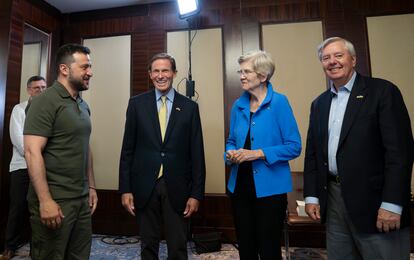Ukraine debates holding elections in the middle of the war to strengthen Zelenskiy’s position
Hardcore supporters of the Ukrainian president are in favor of elections to consolidate his political power as a response to a dip in his popularity and to give him a mandate to see the country through to the end of the conflict

Volodymyr Zelenskiy stated three months ago that it was impossible to hold elections in wartime. So it is written in the Ukrainian Constitution and under the terms of the martial law that is in force. But politics is also the art of seizing opportunities when they present themselves, and the hardcore of the Ukrainian president’s support is now advocating calling on citizens to vote in 2024 to elect the parliament — the Rada — and the president. The Rada’s session ends in October and the presidential elections should be called in March 2024. Sources consulted by EL PAÍS explain Zelenskiy’s new position as an attempt to halt his decline in popularity and to have the popular mandate in any negotiations that could put an end to the war with Russia.
Summer in Kyiv has been abuzz with rumors. On the part of both the supportive media and those critical of Zelenskiy, there have been analyses on the feasibility of organizing elections. The about-face from the upper echelons of power was made on July 29 by the chairman of the Rada, Ruslan Stefanchuk, a staunch Zelenskiy backer. Stefanchuk surprised citizens in Telemarathon — a news program on television channels close to the government — by taking it for granted that “an update of the law would take place soon” so that elections could be held. “We have to understand that democracy cannot stop. It is what Europe and others have told us.”
The “others” that Stefanchuk was implicitly referring to are, above all, the two major U.S. political parties. After a meeting with Zelenskiy in Kyiv on Wednesday, two senators from the Democratic Party, Elizabeth Warren and Richard Blumenthal, as well as Republican Lindsey Graham, stressed that they considered it necessary for Ukrainian democracy to hold elections despite the country being at war. The Democratic position has a lot to do with the upcoming presidential election in the United States, which will be held in November 2024. The Republican Party has numerous prominent members (including former President Donald Trump) who have criticized military support for Kyiv, and who, since last spring, have used the argument that Ukraine is not so different from Russia, since the country has suspended democracy under the pretext of war.
But the media and analysts in Ukraine point out that if Zelenskiy’s team intends to hold legislative and presidential elections, it is not due to foreign pressure, but for domestic reasons. Mark Savchuk, a political commentator and adviser to the Ukrainian National Anti-Corruption Office, explains: “Zelenskiy is a great public relations man, especially with the international community, and we are lucky for that, but if there is now talk of going to the polls it is because of Ukrainian internal issues that he does not want to be aired abroad.”
These internal questions are numerous. For Savchuk, the main one is that the promise with which Zelenskiy came to power in 2019, to apply deep reforms to end corruption, has not materialized. “Only in the judiciary have there been improvements, but neither Zelenskiy nor his team are prepared. Ordinary Ukrainians see that this is still a corrupt country, they experience it on a daily basis and there are always new stories about it in the news,” says Savchuk, adding: “Their team is inept and corrupt. We have a serious corruption problem and they believe that their popularity will slip, so they want to take advantage of their charisma now electorally.”
Dealing with the problem of corruption is the highest priority, as demonstrated by the fact that Zelenskiy announced during a television interview this Sunday that he will propose to the Rada that the crime of corruption should be equated to treason while the war lasts.
The Pravda daily newspaper published an article on August 17 in which it concluded that the law prevents elections from being held and that the difficulties of organizing them in wartime are enormous, but if Zelenskiy’s core supporters are pushing for it, it is largely to consolidate their power. A small number of faithful in the president’s office have accumulated all the power to the detriment of the council of ministers, according to Pravda. On August 21, another newspaper, Telegraf, ran a story on the impact of the distancing that has occurred between the legislative deputies of Servant of the People (Zelenskiy’s party), which has an absolute majority in the Rada, and the hardcore of the government. In June, Stefanchuk, one of the ideologues of Servant of the People, hinted in Pravda that the political platform’s days were numbered. Given its falling popularity in the polls, according to Telegraf, work is being done to find a way to hold the two elections in the spring or autumn of 2024 with a new party list that could be called the Zelenskiy Bloc.
Mandate to end the war
Sources close to the Ukrainian Foreign Ministry, who have asked to remain anonymous, explained to EL PAÍS that the idea being floated is to call elections in the spring of 2024 with the aim of legitimizing the president and his new government as the war enters its endgame. Any outcome that will end the invasion must go through a negotiating committee, these sources indicate, and whoever sits at the table must have unquestionable political weight.
The British magazine The Economist caused a stir in Ukraine by publishing an analysis on August 20 in which it warned that ordinary Ukrainians’ spirits are flagging due to the lack of results on the battlefield and the expectation of a long war. The Economist influenced the debate opened by Zelenskiy’s entourage on the need for a general election: “The logic is that it is better for him to seek re-election while he is a national hero, instead of doing it later or being forced into peace talks that end with an unpopular ceasefire or large territorial concessions.”
Ivan Gomza, Director of Public Policy and Governance at the Kyiv School of Economics, says: “The only positive aspect I would see is the question of legitimacy.” And he adds: “Any opponent of Zelenskiy could say in 2024, with his mandate expired, that he is negotiating without being a president elected by the citizens.”
For Savchuk, the legitimacy argument “is a public relations farce,” partly because he is convinced that if Zelenskiy has learned anything, it is that nothing can be negotiated with the Russians. “If they want elections, it is because they will have more power, and the people who depend on him will be pleased because they will go from being millionaires to multimillionaires.”
Savchuk, Gomza, and Pravda all agree on two aspects: the first is that they are convinced that the public is not in favor of exercising their right to vote during the war; the second is that they see too many setbacks to organizing the elections with any guarantees. Gomza lists six obstacles that are insurmountable:
- It is not feasible to open polling stations in the territories occupied by Russia or in areas close to the front, which is 1,200 kilometers (745 miles) long.
- It is extremely difficult to organize the vote for the more than six million refugees abroad — the number of voters would be lower because 30% are minors.
- How can serving troops leave their positions to vote? In Ukraine there are about 700,000 people involved in state defense activities.
- There is a risk that the Russians will target concentrations of people in polling stations.
- Elections require months of preparation, transporting the ballot boxes, counting the votes, and electoral campaigning carried out with very few safety guarantees.
- Any wartime elections, even municipal ones, would not have a balanced diversity of candidates because people will vote for whoever is in power. “It is reasonable that, in a context like this, nothing changes politically,” says Gomza.
Stefanchuk himself warned in his defense of calling the election that one of the objectives of going to the polls is not to generate instability or divisions in the country. It would be difficult to run a negative electoral campaign in which the opposition criticizes the head of state who is defending a country that its enemy wants to eliminate. Furthermore, as our sources indicate, no one in Ukraine is as popular as Zelenskiy. Only one person could rival him, the Commander-in-Chief of the Ukrainian Armed Forces, Valerii Zaluzhnyi. But on numerous occasions his office has communicated to the media — including this newspaper — that the general has no intention of entering into politics.
Sign up for our weekly newsletter to get more English-language news coverage from EL PAÍS USA Edition
Tu suscripción se está usando en otro dispositivo
¿Quieres añadir otro usuario a tu suscripción?
Si continúas leyendo en este dispositivo, no se podrá leer en el otro.
FlechaTu suscripción se está usando en otro dispositivo y solo puedes acceder a EL PAÍS desde un dispositivo a la vez.
Si quieres compartir tu cuenta, cambia tu suscripción a la modalidad Premium, así podrás añadir otro usuario. Cada uno accederá con su propia cuenta de email, lo que os permitirá personalizar vuestra experiencia en EL PAÍS.
¿Tienes una suscripción de empresa? Accede aquí para contratar más cuentas.
En el caso de no saber quién está usando tu cuenta, te recomendamos cambiar tu contraseña aquí.
Si decides continuar compartiendo tu cuenta, este mensaje se mostrará en tu dispositivo y en el de la otra persona que está usando tu cuenta de forma indefinida, afectando a tu experiencia de lectura. Puedes consultar aquí los términos y condiciones de la suscripción digital.









































